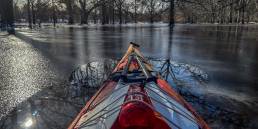Seemingly everyone I know has left behind a piece of equipment or article of clothing at one time or another, which is why I can’t stress enough the importance of marking your paddling gear. Whether it’s the end of an epic surf session or an all-day kayak tour, it’s easy for your mind to drift toward dry clothes, warm food, and the comfort of the couch, rather than ensuring all your stuff made it into your vehicle. Often it’s not until you’re unpacking at home that you realize oh no, where is my…

Winter Wave Riding
One of the many hard lessons I’ve learned over many years playing in the outdoors is the importance of marking your paddling gear. It’s one of those things that I routinely do when I get a new piece of gear and then promptly forget about—until something goes missing, that is.
Just last winter, I was surfing one of my favorite standing waves with a group of friends at night in a snowstorm—trust me, it sounded better in my head. While surfing, the storm picked up and knocked the GoPro I had set up on shore into the river. I didn’t notice the camera was missing until we were wrapping up.
We searched everywhere for the camera that night, but between the dark, the cold, and the feeling that we were looking for a needle in a haystack, we gave up. I came back the next morning hoping to get lucky, but had to concede it was gone after we came up empty-handed combing the river banks. Not the ideal outcome, but it seemed like a fair price to pay for surfing in a snowstorm.
The camera was a distant memory six months later when I received a call from someone who had found my missing GoPro. It had washed up on the bank of the river three miles down from the wave we were surfing. I had written my name and phone number on the case of the camera.
The moral of the story is that I got my camera back and while the case was trashed, the camera amazingly still worked after spending the winter in the river. As a bonus, the images from my snowstorm surf session were intact.

Why Paddlers Should Mark Their Gear
Sure, marking your gear can make you feel like you’re back in second grade and an adult is writing your name on the tag of your coat, but it’s a good idea, and particularly important for paddlers.
The U.S. Coast Guard recommends attaching an If Found sticker to all watercraft—that is, a sticker that lists the name of the boat’s owner and their contact information. The benefits of If Found stickers are so great that many states (like Connecticut, Maine, and Massachusetts) give them away for free. If you don’t have an If Found sticker, a Sharpie provides a suitable alternative—write your contact information on your boat so that someone can see it.
There are numerous reasons to equip your kayak, canoe, and paddleboard with an If Found sticker. Most notably, it can save time and resources when a loose craft is discovered without anyone in it or around its vicinity. The sticker allows the Coast Guard to quickly identify a craft’s owner, contact them, and ensure they’re safe—preventing unnecessary rescue operations.
For example, an empty kayak adrift off the coast of Martha’s Vineyard this July triggered a roughly 12-hour rescue effort before the craft was determined “derelict” and there was no missing person to search for. In addition to being an enormous waste of time and money, events like this spread rescue resources thin in the case of a real emergency.

While it’s critical to mark your kayak, canoe, and paddleboard, labeling your other paddling gear is a smart habit to get into. PFDs, paddles, dry bags, and even a camera should have some type of identification. Again, a Sharpie works great. Ultimately, it can help prevent expensive and time-consuming rescue operations and maybe help your stuff find its way home like my GoPro did this spring.
Stay Safe on the Water
Staying safe is an essential part of paddling. In the end, marking your gear is a good idea. If you ever have an accident on the water, you don’t want the Coast Guard to be occupied searching the water for the owner of a kayak that just drifted away from their dock.
Luke Foley
Luke Foley is passionate about discovering and sharing hidden local treasures and has long been a New England adventure enthusiast. After all, there are only a few places where you can skin for fresh tracks in the morning and have a sunset surf session on the same day.
Related Posts
April 2, 2024
10 Tips for Mountain Biking Etiquette During Mud Season
One rough spring could ruin the…




